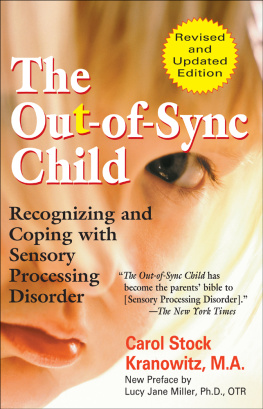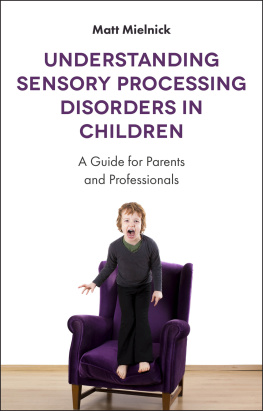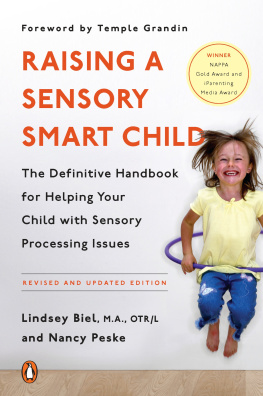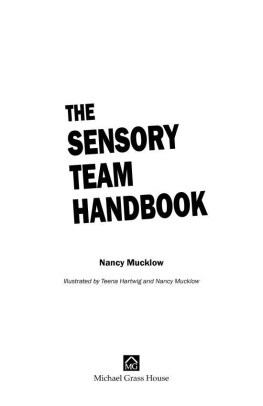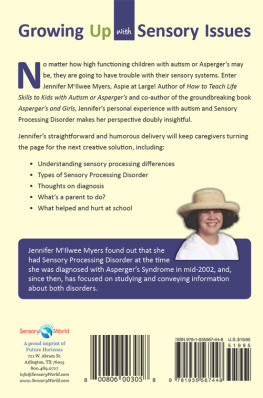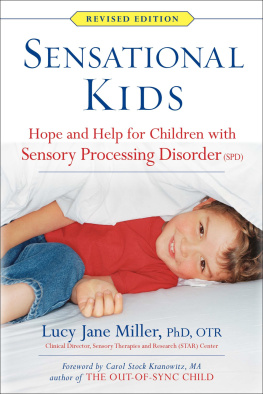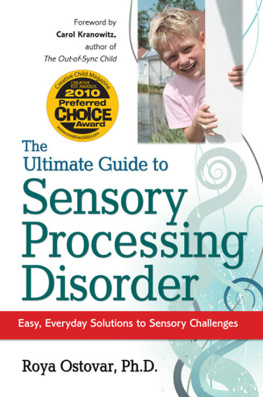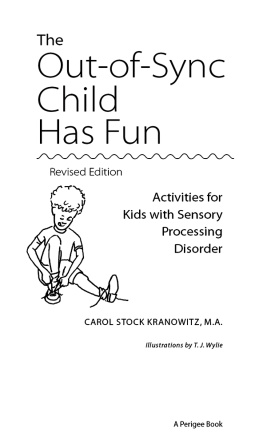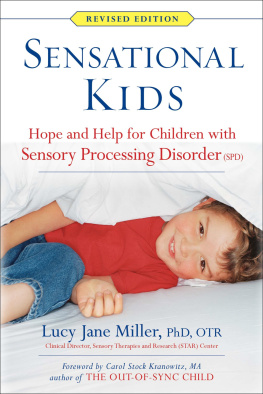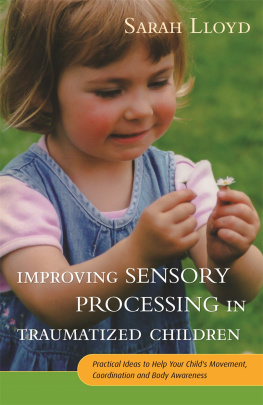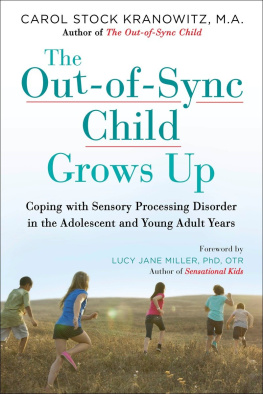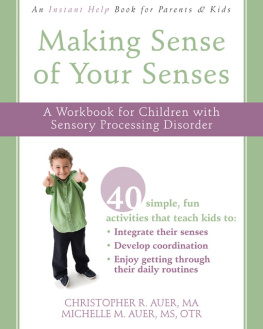This book is great! It is a real contribution to the parents of the many children who are so hard to understand. It will let parents off the hook of blaming themselvesand will help them get on to the job of addressing the childs underlying difficulties.
T. Berry Brazelton, MD, founder, Brazelton Foundation, Childrens Hospital, Boston
Carol Stock Kranowitz has helped many parents understand more about [sensory processing disorder] and how it manifests itself in children.
Sunday News (Lancaster, PA)
Kranowitz writes intelligently about a bewildering topic.In concise, well-organized chapters, Kranowitz reveals how the tactile, vestibular (pertaining to gravity and movement), and proprioceptive (pertaining to joints, muscles, and ligaments) senses operate.[She] helps clear the way for families to understand a disorder that they may suspect but have not been able to pinpoint.
Publishers Weekly
A book that demystifies [sensory processing disorder]. As a music, movement, and drama teacher, [Kranowitz] has developed a purposeful curriculum that integrates sensorimotor activities into the preschool day.
The Ithaca Journal (Ithaca, NY)
Warm and wise, this book will bring both hope and practical help to parents who wonder why their kid doesnt fit in.
Jane M. Healy, PhD, learning specialist and author of Your Childs Growing Mind
The Out-of-Sync Child does a masterful job of describing the different ways children react to sensations and integrate their responses to their world. The book provides detailed, practical information that will help parents understand how the nervous system works.
Stanley I. Greenspan, MD, child psychiatrist and author (with Serena Wieder) of The Child with Special Needs
Comprehensive yet easy to understandhelpful tools for parents to promote healthy integration.
The Out-of-Sync Child is written for and can be easily understood by parents and non-professionals. Carol Stock Kranowitzs description and discussion of [sensory processing disorder] give a clear and concise picture of a disability. This book is a model for taking a little-known, and often-missed disability and making it accessible to the people most in need of this information.
Kranowitz gives excellent examples of typical indicators that can signal a parent (or caregiver) that a [sensory processing disorder] may be present.[She also] gives the reader concrete information and a testing checklist to help evaluate whether a child might have a [sensory processing disorder].
This is a great book and a must-read for any parent who thinks their child might have unusual behavior difficulties. Kranowitz avoids hypertechnical language and explanations. Instead, her treatment of sensory integration issues relies on common sense and clear examples. The book is so well written that readers will be tempted to use Kranowitzs analytical approach when they read about other behavior or learning disabilities. Its calming tone and no-nonsense approach give parents the power to positively address their childs [sensory processing disorder].
The Exceptional Parent
T HE
O UT-OF- S YNC
C HILD
Recognizing and Coping
with Sensory Processing Disorder
Revised and Updated Edition
C AROL S TOCK K RANOWITZ , M.A.
A S KYLIGHT P RESS B OOK
A Perigee Book
A PERIGEE BOOK
Published by the Penguin Group
Penguin Group (USA) Inc.
375 Hudson Street, New York, New York 10014, USA
Penguin Group (Canada), 90 Eglinton Avenue East, Suite 700, Toronto, Ontario M4P 2Y3, Canada (a division of Pearson Penguin Canada Inc.) Penguin Books Ltd., 80 Strand, London WC2R 0RL, England Penguin Ireland, 25 St. Stephens Green, Dublin 2, Ireland (a division of Penguin Books Ltd.) Penguin Group (Australia), 707 Collins Street, Melbourne, Victoria 3008, Australia (a division of Pearson Australia Group Pty Ltd.) Penguin Books India Pvt. Ltd., 11 Community Centre, Panchsheel Park, New Delhi110 017, India Penguin Group (NZ), 67 Apollo Drive, Rosedale, Auckland 0632, New Zealand (a division of Pearson New Zealand Ltd.) Penguin Books (South Africa), Rosebank Office Park, 181 Jan Smuts Avenue, Parktown North 2193, South Africa Penguin China, B7 Jiaming Center, 27 East Third Ring Road North, Chaoyang District, Beijing 100020, China
Penguin Books Ltd., Registered Offices: 80 Strand, London WC2R 0RL, England
While the author has made every effort to provide accurate telephone numbers, Internet addresses, and other contact information at the time of publication, neither the publisher nor the author assumes any responsibility for errors, or for changes that occur after publication. Further, the publisher does not have any control over and does not assume any responsibility for author or third-party websites or their content.
Copyright 2005 by Skylight Press and Carol Stock Kranowitz
Cover photograph by Tony Stone Images
Interior illustrations by T. J. Wylie
All rights reserved.
No part of this book may be reproduced, scanned, or distributed in any printed or
electronic form without permission. Please do not participate in or encourage piracy of
copyrighted materials in violation of the authors rights. Purchase only authorized editions.
PERIGEE is a registered trademark of Penguin Group (USA) Inc.
The P design is a trademark belonging to Penguin Group (USA) Inc.
PUBLISHING HISTORY
Original Perigee trade paperback edition / March 1998
Revised Perigee trade paperback edition / August 2005
The Library of Congress has cataloged the original Perigee trade paperback edition as follows:
Kranowitz, Carol Stock.
The out-of-sync child : recognizing and coping with sensory integration dysfunction/by Carol Stock Kranowitz; foreword by Larry B. Silver.
p. cm.
Includes bibliographical references and index.
ISBN: 978-1-101-04261-8
1. Minimal brain dysfunction in children. 2. Sensorimotor integration.
3. Perceptual-motor learning. I. Title.
RJ496.B7K72 1998
618.928dc21 97-14601
Research about sensory processing disorder is ongoing and subject to interpretation. Although all reasonable efforts have been made to include the most up-to-date and accurate information in this book, there can be no guarantee that what we know about this complex subject wont change with time. Readers with concerns about the neurological development of their children should consult a qualified professional. Neither the publisher, the author, nor the producer take any responsibility for any possible consequences from any treatment or action by any person reading or following the information in this book.
Most Perigee books are available at special quantity discounts for bulk purchases for sales promotions, premiums, fund-raising, or educational use. Special books, or book excerpts, can also be created to fit specific needs. For details, write: Special Markets, Penguin Group (USA) Inc., 375 Hudson Street, New York, New York 10014.

P REFACE TO 2 ND E DITION
by Lucy Jane Miller, PhD, OTR
In 1955, Dr. A. Jean Ayres wrote her first article related to the theory of sensory integration; in 1972, her first book was published and an entire field was launched. Based on her work, Carol Kranowitz, a preschool educator for twenty-five years, helped dozens of children who manifested sensory integration dysfunction with the consultation of an occupational therapist (OT) who had been trained by Dr. Ayres. Dr. Ayres passed away in 1988 and with her went the knowledge base and energy that only a founder of a new vision can have. Although OTs still practiced and taught courses on sensory integration, the field had lost its leader.

